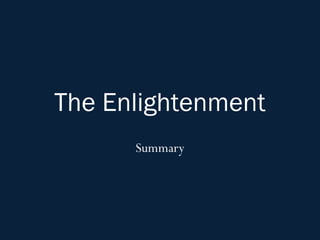The enlightenment overiew
- 1. The Enlightenment Summary
- 2. Objectives • How did scientific progress promote trust in human reason? • How did the social contract and separation of powers affect views on government? • How did new ideas affect society and the economy? • Identify the philosophies of major Enlightenment thinkers such as: John Locke, Baron de Montesquieu, Adam Smith.
- 3. Scientific Revolution Leads to Enlightenment • 1500-1700: European scientists using reason to discover laws of nature – Very successful: Planetary movements, chemistry, vaccine for smallpox, etc. • Early 1700’s: If people used reason to find laws that governed the physical world, why not use reason to discover natural laws? – Laws that govern human nature – Reformers begin studying human nature and societal problems
- 4. Major Enlightenment Ideas • Every social, political and economic problem could be solved through the use of reason • Governments are created to secure an orderly society • Separation of powers is the best way to protect human liberties • All men are created “free and equal” • A free market should be allowed to regulate trade
- 5. Enlightenment Thinkers Voltaire John Locke Baron de Montesquieu
- 6. Social Contract Thomas Hobbes John Locke •Humans are naturally cruel, •Humans are naturally greedy and selfish. reasonable, moral and good •To escape this “brutish” life •Humans have natural rights: life people entered into a social liberty and property contract. •People form governments to •Only a powerful government protect natural rights could ensure an orderly society. •Best government was one with •Believed only an absolute limited power monarchy could keep a society •If a government violates people’s completely orderly. natural rights, people have the right to overthrow government
- 7. Separation of Powers • Baron de Montesquieu: Criticized absolute monarchy and admired British government – British protected themselves from tyranny by dividing powers of government between three branches: legislative, executive and judicial (misconception) – Each branch of government should be able to ‘check’ the other two • What government does this sound like?
- 8. Enlightenment and the Economy • Physiocrats rejected mercantilism in favor of a policy called laissez faire. – Physiocrats were Enlightenment thinkers who focused on economic reforms • Laissez-Faire: allowing business to operate with little or no government interference – Real wealth comes from productive land not gold and silver – Supported free trade and opposed tariffs
- 9. Enlightenment and the Economy • Adam Smith: Free market should be allowed to regulate business activity – Manufacturing, trade, wages, profits and economic growth are all linked to the market forces of supply and demand – Where there is demand, suppliers will seek to meet it because there are profits and economic rewards to be had – Smith supported laissez faire, but also believed that a government had a duty to protect society, administer justice, and provide public works. • His ideas lead to very productive economies during the Industrial Revolution (1800’s and 1900’s)
- 11. Major Enlightenment Ideas for Society • Detested the slave trade and slavery • Deplored religious prejudice • Defended freedom of speech • Attacked divine right theory • Urged education for all • Hated unequal distribution of property • Believed governments should be freely elected • Women’s first duty was to her family
- 12. Enlightenment Changes Society • Women: Women were not equal and were criticized for attempting to gain equality • Salons: Men and women gather in living rooms to discuss Enlightenment ideas (chat rooms) • Music: Ballets and operas become popular (Bach, Handel, Mozart) • Art: Baroque gives way to rococo art (simple, elegant and charming) • Literature: Novels become popular (Robinson Cruesoe)
- 13. Enlightenment Changes Society • Majority/Lower Class/Peasants: Slow to change and hurt the worst – Serfdom disappears in the west, rises in the east – Peasants in Western Europe allowed to own or rent land – All peasants throughout Europe dealt with similar issues • Forced into military • Lands could be torn up without compensation by nobility • Some peasants become eager for change, some resist change completely
- 14. REVIEW QUESTIONS Who believed that people are naturally cruel and greedy? a) Montesquieu b) Hobbes c) Rousseau d) Voltaire Which of the following is true of the physiocrats? a) They rejected laissez faire in favor of mercantilism. b) They rejected mercantilism in favor of laissez faire. c) They rejected both mercantilism and laissez faire. d) They focused on social reform.
- 15. REVIEW QUESTIONS Who believed that people are naturally cruel and greedy? a) Montesquieu b) Hobbes c) Rousseau d) Voltaire Which of the following is true of the physiocrats? a) They rejected laissez faire in favor of mercantilism. b) They rejected mercantilism in favor of laissez faire. c) They rejected both mercantilism and laissez faire. d) They focused on social reform.
- 16. The market price of Enlightenment Thinkers every particular commodity is In republican governments, men are regulated by the all equal; equal they are also in despotic governments: in the former, proportion between because they are everything; in the the quantity which is latter, because they are nothing. actually brought to market, and the ~Baron de Montesquieu The Spirit of demand of those who of Nations Vol.I, bk.1, ch.7 ~Adam Smith The Wealth Laws Bk. VI, Ch.2 are willing to pay the natural price of the The reason why men enter into commodity or the society is the preservation of their whole value of the property, and putting themselves rent, labor and profit under government, is the which must be paid in preservation of their property. order to bring it ~John Locke Second Treatise of Government thither. ChXIX, “Of the Dissolution in Government”
